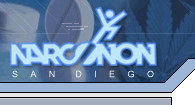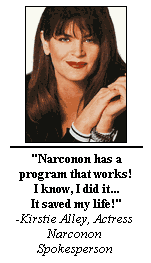

| 1-800-871-4350 |
 |
 |
 |
 |
 |
 |
 |
 |
 |
 |
| NARCONON FACTS |
|
When conventional drug rehabilitation methods are not working with a drug-addicted person, there are effective drug rehabilitation alternatives to pursue before one gives up.
An important aspect of the Narconon program is the systematic application of techniques to improve communication and interpersonal skills in persons dependent on alcohol and/or drugs. The premise of the Narconon Program is that a former addict can achieve a new life. Ignorance about or failure to abide by the common moral precepts of our society can lie at the root of many of the addict�s life problems. |
| RESOURCES |
 |
Funding pledged to fight drug abuse Mayor Thomas M. Menino pledged yesterday to allocate $180,000 in city funds to combat heroin and prescription drug abuse and said he'll use his office as a "bully pulpit" to push alternative treatments for adolescent addicts.
"This is an epidemic threatening to tear apart the fabric of Boston's neighborhoods," Menino said, pledging to support "new solutions to a very difficult problem." The mayor's initiative, entitled Neighborhoods Organizing Against Drugs, would double from 300 to 600 the number of users who can be treated with acupuncture, often used to ease withdrawal, and Buprenorphine, a drug given to some addicts of heroin and opioids such as OxyContin, Percocet, and Vicodin. Menino's plan also provides small grants for drug-prevention community groups and the hiring of a full-time health educator to focus on substance-abuse issues. It also calls for electronic tracking of overdose records so they can be more readily shared among police, emegency medical technicians, and neighborhoods. The initiative marks a shift in how the city is handling its substance-abuse problems among young people. While Menino and Police Commissioner Kathleen M. O'Toole said they would still pursue drug dealers, they also noted the importance of intervention, particularly for the youngest offenders with a family support system. "While the police play a crucial role, at the end of the day we see this as a public health problem," Menino said. "I know it isn't popular to advocate treatment for addicts, but that is just what we all need to do." O'Toole said the department makes thousands of substance abuse-related arrests every year, but that it is committed to a "multipronged" approach of prevention, intervention, and enforcement. John Auerbach, executive director of the Boston Public Health Commission, said that the city's "black market" of prescription drugs such as OxyContin often leads young people to heroin use. According to the commission, the city's heroin-related hospitalization rates increased 78 percent among 15- to 24-year-olds in the past two years alone. Deaths resulting from heroin overdoses have spiked 500 percent in Boston during the last 10 years. With the increasing purity and availability of heroin -- selling on the street for as little as $4 a bag -- the drug has permeated a younger crowd and flooded the state's drug-abuse hot line with calls from parents. "We've heard from parents of adolescents. We've heard from EMTs shaken up after transporting 14-year-olds," said Auerbach. "And we've heard from people we regularly have to turn away every day seeking detox services, because they simply cannot find the beds for them to receive treatment." Menino criticized Governor Mitt Romney for cuts in drug-treatment funding and said he will promote increased state and federal support to fight substance abuse. Maryanne Frangules, the executive director of the Massachusetts Organization for Addiction Recovery, praised Menino's commitment. She said grieving families affected by substance abuse can no longer wait. "How many times do you read an obituary that says `died suddenly'? I'll tell you what it means -- it means somebody died of an overdose," Frangules said. "We all have a voice. There are powerful voices within this community." |
| Quote |

 |
| Link
to Us! |
Show your support, link to us! |
 Funding pledged to fight drug abuse
Funding pledged to fight drug abuse
